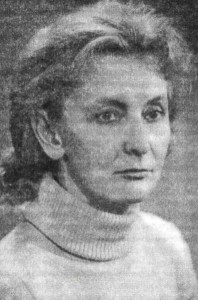 Aushra Augustinavichute was born on April 4, 1928, in the Lithuanian SSR, into a family of a large book publisher. This had an impact on Aushra’s childhood, as she loved to read from an early age, as all the newest books were always available to her. After receiving a degree in finance from Vilnius University, she taught political economics, and from 1968, she was the dean of the Faculty of Family Studies for a while. In the late 1960s, Aushra became acquainted with the most important discoveries in psychology that formed the basis of her development of socionics: Jung’s typology, Freud’s psychoanalytic theory and Kepinski’s theory of information metabolism.
Aushra Augustinavichute was born on April 4, 1928, in the Lithuanian SSR, into a family of a large book publisher. This had an impact on Aushra’s childhood, as she loved to read from an early age, as all the newest books were always available to her. After receiving a degree in finance from Vilnius University, she taught political economics, and from 1968, she was the dean of the Faculty of Family Studies for a while. In the late 1960s, Aushra became acquainted with the most important discoveries in psychology that formed the basis of her development of socionics: Jung’s typology, Freud’s psychoanalytic theory and Kepinski’s theory of information metabolism.
There is a popular myth that Aushra single-handedly developed socionics, but this is not true – many enthusiasts who were inspired by the idea of creating a new direction in psychology helped her. Some suggested using aspect symbols, others developed principles of intertype relationships, and still others worked on creating descriptions of types, and much more.
Such coordinated work by researchers became possible only thanks to Aushra’s persistent efforts. Thus, during the popularization of socionics, she spoke at various conferences, conducted seminars and training sessions and conducted practical experiments. Books and brochures were distributed through selftitled, which were passed from hand to hand. Socionics gained both supporters and opponents, who still strive to equate it with pseudoscience.
Speaking in large cities of the USSR, Aushra interested a sufficient number of people in socionics to introduce this new science to the masses. Interestingly, most socionics enthusiasts were not professional psychologists, but people from a wide range of professions: engineers, mathematicians, philologists, programmers, and others. Thus, socionics showed that it is not just the knowledge of a narrow circle of people. These supporters still develop socionics in the countries of the former Soviet Union, run socionic schools and clubs, and also conduct scientific conferences, training sessions, and consultations.
In the 1990s, due to deteriorating health, Aushra gradually stepped back from socionic activities and only occasionally attended conferences. She died on August 24, 2005, at the age of 77. Aushra had no children, as she believed that they “interfere with a real researcher.” Symbolically, we can imagine that we all, socionics enthusiasts, are Aushra’s socionic children because without her, there would be no socionics. We thank her for her great work.
